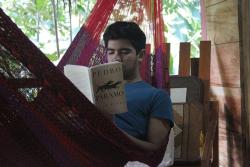William's Sparrow
“William’s Sparrow”
It was night again. Near the window he sat with a hollow look on his rugged face while his tiresome eyes scouted the empty moist cobblestone lane in hope of another human soul. He knew nobody was coming, but still, a fragile thought in his subconscious persuaded him to stay.
Having lost the count of days he had spent there, in those old hallowed Birmingham woods where he used to spend the long winters sitting lonely by the fireplace and walking through the untouched and unexplored forests, he now felt youthless. He acknowledged that this was probably one of the worst feelings he had ever had: knowing he was rapidly aging. It was not the same as before, for his knees could no longer sustain his desires to hike indefinitely through the charming woods as he had done in his prime. They had served their purpose far too many times during his life, but now no more. Nowadays, William was more used to being sat down instead of standing upright. He had now more time to write, to think, to live.
But on this cold December night he could not write. He lacked a source of inspiration. Inspiration is a proud, temperamental mistress. If you give her the time and attention she deserves, she is yours. Slight her and there will come a night when you call and she will not answer. Tonight was one of those nights. It had been far too long since he last wrote.
Poised in the wooden table were two pitiful orchid flowers. How could a flower be the source of inspiration? William inquired about all of those poets which established that their main source of inspiration were flowers. Madness. That’s what it was. He did not deny their beauty, he denied their ability to turn a man into a poet.
This noble gentleman’s thoughts were now focused on a woman he had met ages ago. It was during a warm summer near Aylesbury, where the mead flew thinner than water and the blood ran thick through the streets. After a heated argument and a short lived bar brawl, William had met Aldith. O speak again of her undoubtedly beauty, dear beloved Aldith. William’s devotion for her had risen as high as a sparrow flies in the morrow when the warm lights of the powerful sun start to have their effect on nature. William had tried to persuade her to concede her hand in marriage, but her father stated with a clear lack of courtesy that it was an impossible marriage due to family politics. William was not a man of fortune, but he was a man of character.
And so in this December night where William remembered his summer in Aylesbury, in spite of having a short moment of despair, he decided to write. Inspiration had come to him in form of a memory. And so he wrote about a gallant young man named Romeo in love with a fair lady named Juliet. When he was done, he put the feather and quill down on the table to rest and looked up just to the first lights of the sun starting to shine, and a sparrow flying high above the trees fighting against the strong winds. He felt pity for the bird, having to fight every morning against those high winds Then he felt pity for himself, for the bird had the freedom to come and go, while he was stuck in a cabin in Birmingham waiting for the cold embrace of death to come.
